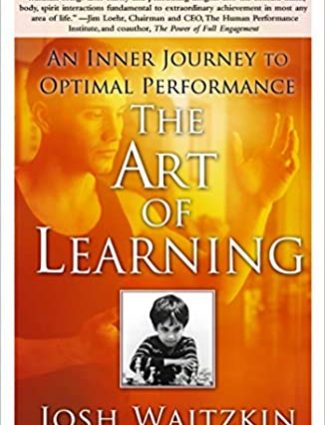The art of learning by Josh Waitzkin

Josh Waitzkin the international Chess Master. He started playing chess when he was 6 years old and a year later he trained with a first formal trainer. After ending a successful career in chess, he started his learning adventure in martial arts. He chose Thai Chi Chuan as a complete beginner, and a few years later he became World Champion.
In his book he describes his experience with learning and how he could succeed in two different disciplines. For me, the fact that he succeeded in chess is not super impressive, but the ability to distill the principles of learning and apply them to a different discipline, sets him apart from other masters.
His advice is to embrace failures as something that is required in a process of learning. When he lost a competition, he dissected what was the major cause and tried to replicate such conditions in his training process to improve in the future. He noticed for example that noise distracted him, so he started practicing in a noisy environment.
Training with a better opponent is Josh’s one way to achieve mastery in the trained discipline. It brings us out of our comfort zone as we can lose, hence it is unpleasant. Yet as Josh was defeated many times during training, his body and mind learnt how to embrace pain and loss.
“In the long run, painful losses may prove much more valuable than wins — those who are armed with a healthy attitude and can draw wisdom from every experience, ‘good’ or ‘bad,’ are the ones who make it down the road.”
Pursue Depth not Breadth
Josh suggests training of basics until it becomes ingrained in the body or head. Time slows down as the conscious mind doesn’t need to focus on things that are already performed automatically. The things which weren’t obvious become clearly visible.
Josh points out that learners often neglect the basics and move too soon to more complex things. They often pursue shiny new objects, because this is more tempting. As described by Anders Ericsson in his book “Peak Secrets from the new science of expertise”, learning ends with reaching plateau and the indicator of a peak performer is his ability to rise above the plateau and keep practicing. One way for doing this is to raise the difficulty level a bit. Josh experienced this when during a tournament he broke his arm. He refused to stop the training, and he kept training with one hand. Soon he could defeat opponents with his one hand. He showed by example how to turn adversity into advantage.
